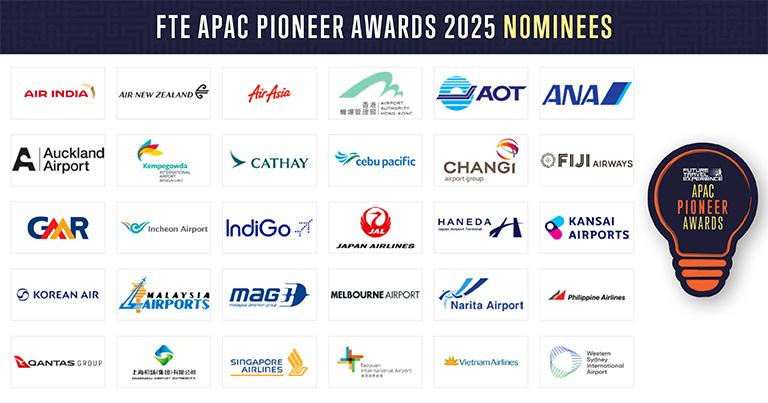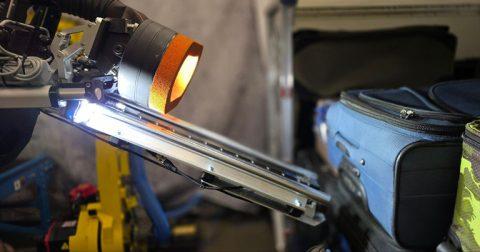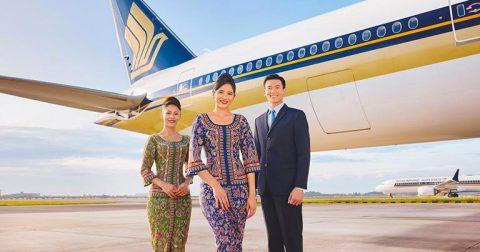The shortlists for the FTE APAC Pioneer Awards 2025 have been unveiled ahead of the presentation ceremony at the free-to-attend APEX FTE Asia Expo 2025, which will take place in Singapore on 11-12 November. The FTE APAC Pioneer Awards shine a light on the 30 airlines and airports from across Asia-Pacific who are pushing the boundaries of innovation, enhancing the customer experience, and playing a vital role in advancing the air transport industry. Ten of the 30 nominees will be presented with an ‘Outstanding Achievement’ trophy during the presentation ceremony in Singapore, which will provide the perfect opportunity to honour the region’s innovators among industry peers and colleagues. Congratulations to all of the airlines and airports that have been nominated!
See our 12 reasons to attend APEX FTE Asia Expo 2025 >> Register for APEX FTE Asia Expo 2025 – free to attend >>FTE APAC Airline Pioneer Awards 2025 nominees:
Singapore Airlines
 Over the past 12 months, Singapore Airlines has led a comprehensive digital transformation underpinned by responsible artificial intelligence (AI). Following the launch of its enterprise AI strategy in 2022, the airline has successfully embedded AI across the organisation – driving innovation, operational efficiency, and customer satisfaction, all while upholding rigorous governance aligned with Singapore’s Infocomm Media Development Authority (IMDA) guidelines.
Over the past 12 months, Singapore Airlines has led a comprehensive digital transformation underpinned by responsible artificial intelligence (AI). Following the launch of its enterprise AI strategy in 2022, the airline has successfully embedded AI across the organisation – driving innovation, operational efficiency, and customer satisfaction, all while upholding rigorous governance aligned with Singapore’s Infocomm Media Development Authority (IMDA) guidelines.
In April 2024, Singapore Airlines introduced the world’s first GenAI-powered Flight Recommender, enabling customers to plan complex itineraries using natural language. This innovation has saved travellers approximately 2,500 hours per day. Combined with an enhanced chatbot and a proprietary AI-based customer insights platform, the airline has seen significant improvements in satisfaction and responsiveness.
AI has delivered an estimated US$2.73 million in annual business value by optimising fleet and tail assignment. Proprietary GenAI tools have reduced customer case handling time significantly, empowered engineers with faster root-cause analysis via semantic search, and enabled Kris+ partnership managers to complete lead generation in minutes rather than hours.
The airline’s in-house GenAI platform, Jarvis, has achieved mass penetration across the operational workforce. From over 300 AI use cases identified by staff, 83 have been successfully implemented. A structured AI education programme boasts high participation among management, while the SMARTbot training platform offers AI-generated customer service simulations for cabin crew.
Singapore Airlines has established pioneering partnerships with OpenAI and Salesforce and works closely with IMDA and A*STAR to advance AI governance and cybersecurity in aviation.
By democratising responsible AI and focusing on meaningful business outcomes, Singapore Airlines is not only adopting future technologies – it is actively defining the future of aviation.
Singapore Airlines is a Headline Partner of APEX FTE Asia Expo, taking place in Singapore on 11 to 12 November 2025.
See our 12 reasons to attend APEX FTE Asia Expo 2025 >> Register for APEX FTE Asia Expo 2025 – free to attend >>Cathay Pacific
 Cathay Pacific is accelerating its digital transformation with a clear mission: to give customers more choice and control – on the ground, in the air, and across digital channels – while building a future-ready organisation known for its strong digital culture and innovation.
Cathay Pacific is accelerating its digital transformation with a clear mission: to give customers more choice and control – on the ground, in the air, and across digital channels – while building a future-ready organisation known for its strong digital culture and innovation.
A major milestone in 2025 was the launch of Cathay Technologies, a wholly-owned subsidiary created to scale Cathay’s digital solutions beyond the airline. With a vision to become a digital leader in aviation, Cathay Technologies’ first strategic initiative is a partnership with Hong Kong Science and Technology Park (HKSTP), co-investing in high-potential startups through the Co-Acceleration Programme Fund.
The airline is also advancing its conversational AI roadmap, integrating cutting-edge language AI to create more intuitive, personalised digital interactions. At the same time, Cathay continues to enhance the customer journey with features like a seamless booking experience, contactless boarding, and complimentary high-speed WiFi for First and Business Class passengers onboard connected aircraft.
In a landmark collaboration with SITA (a Corporate Partner of the FTE Digital, Innovation & Startup Hub), Cathay Pacific is deploying SITA Connect Go across 51 global airports, providing dual connectivity and bandwidth of up to 300 Mbps. This supports the airline’s transition to cloud-based operations and boosts global operational efficiency.
Further underscoring its commitment to digital leadership, Cathay opened a new Digital and IT Campus in Shenzhen. More than a workplace, this innovation hub includes Cathay’s first dedicated Innovation Space to drive R&D, experimentation, and cross-functional collaboration.
Cathay Pacific’s transformation goes beyond internal optimisation – it’s about shaping the future of travel through scalable, customer-focused technologies. With strong foundations, strategic investments, and a culture of innovation, Cathay is not just transforming itself – it is helping redefine the aviation industry.
AirAsia
 AirAsia is redefining itself from a leading low-cost carrier into a digitally driven travel and lifestyle platform, offering nearly 20 products and services across one seamless ecosystem. Central to this transformation is MOVE Digital, the digital arm of Capital A, which integrates AirAsia MOVE (formerly airasia Superapp) and BigPay, a growing fintech business.
AirAsia is redefining itself from a leading low-cost carrier into a digitally driven travel and lifestyle platform, offering nearly 20 products and services across one seamless ecosystem. Central to this transformation is MOVE Digital, the digital arm of Capital A, which integrates AirAsia MOVE (formerly airasia Superapp) and BigPay, a growing fintech business.
At the heart of this journey is AirAsia’s mission to “elevate every traveller’s experience”. The rebranded AirAsia MOVE app now delivers a modern, community-led experience – from booking and managing flights to engaging with travel content, games, loyalty rewards, chat features, and lifestyle deals. Customers benefit from a one-stop travel hub offering end-to-end convenience, supported by BigPay’s integrated financial services for seamless payments, budgeting, and travel insurance – redefining how users book, pay, and manage their travel needs in one app.
In 2024, AirAsia MOVE strengthened its regional leadership with the launch of ‘Discover ASEAN’, a dedicated microsite developed in partnership with the ASEAN Tourism Association (ASEANTA). Designed to promote cross-border travel, the platform curates affordable, multi-destination journeys and exclusive deals, further enhancing AirAsia’s role as a catalyst for regional tourism integration through a digital-first approach.
MOVE Digital’s strategy goes beyond technology. It is actively reshaping travel behaviours, bridging gaps between mobility, finance, and lifestyle, while expanding access to travel across Southeast Asia. With a growing ecosystem of services and users, AirAsia continues to democratise travel and unlock new value for its community.
By uniting aviation with fintech, loyalty, and lifestyle under a single digital platform, AirAsia is not just transforming itself – it is pioneering a new era of accessible, community-powered travel in Asia and beyond.
Hear more from AirAsia at APEX FTE Asia Expo, taking place in Singapore on 11 to 12 November 2025. Nadia Omer, Chief Executive Officer, AirAsia MOVE, will deliver the Expo Stage Opening Keynote – ‘Built Different: How AirAsia MOVE is personalising travel, driving new revenue streams, and challenging the OTA status quo’.
See our 12 reasons to attend APEX FTE Asia Expo 2025 >> Register for APEX FTE Asia Expo 2025 – free to attend >>All Nippon Airways
 All Nippon Airways (ANA) is accelerating its digital transformation with a clear vision: to deliver a seamless, stress-free, and smart travel experience while pioneering new frontiers in operational efficiency, immersive technology, and automation.
All Nippon Airways (ANA) is accelerating its digital transformation with a clear vision: to deliver a seamless, stress-free, and smart travel experience while pioneering new frontiers in operational efficiency, immersive technology, and automation.
A key part of this journey is ANA’s involvement in the FTE Smart Ramp programme, which seeks to automate and optimise aircraft turnaround processes. ANA’s innovation challenge focuses on deploying autonomous towing tractors to transport cargo from warehouse to apron – minimising manual labour and improving ramp operations efficiency.
To address training needs and workforce shortages, ANA launched ‘∀TRAS (Atlas)’, a nationwide VR-based training simulator for ground handling staff in October 2024. This solution improves training access, consistency, and operational readiness across ANA’s ground handling network.
Meanwhile, ANA Smart Travel leverages mobile-first and contactless technologies to streamline the passenger journey – from check-in to boarding – boosting both customer satisfaction and operational efficiency.
In the air, ANA has redefined the premium experience with the introduction of THE Room FX in collaboration with Safran. Installed on the Boeing 787-9, this Business Class product features the world’s largest seat in its class for a mid-sized aircraft, complete with privacy doors and next-generation design.
Through its strategic focus on innovation – from automation to the metaverse – ANA continues to lead in reimagining the future of aviation.
Hear more from All Nippon Airways (ANA) in the Premium Conference at APEX FTE Asia Expo, taking place in Singapore on 11 to 12 November 2025. Tomoyuki Kikuchi, Manager, Ground Handling Planning, Airport Support, Operations Support Center, ANA, is speaking in a session focused on ‘Making autonomous airport operations a reality – inspiration from the first movers’.
See our 12 reasons to attend APEX FTE Asia Expo 2025 >> Register for APEX FTE Asia Expo 2025 – free to attend >>IndiGo
 IndiGo is undergoing a comprehensive digital transformation, leveraging advanced cloud technologies, artificial intelligence (AI), machine learning, and data analytics to deliver pioneering solutions that enhance safety, efficiency, and the customer experience.
IndiGo is undergoing a comprehensive digital transformation, leveraging advanced cloud technologies, artificial intelligence (AI), machine learning, and data analytics to deliver pioneering solutions that enhance safety, efficiency, and the customer experience.
A major milestone in this journey is the rollout of the SkyBreathe Pilot App across IndiGo’s Airbus fleet. This innovative tool enhances situational awareness and flight efficiency by providing pilots with real-time, data-driven insights for every phase of flight. It supports smarter decision-making, reduces environmental impact, and aligns with IndiGo’s long-term sustainability goals.
The airline has also successfully completed a large-scale cloud migration initiative, modernising its infrastructure to enhance performance, scalability, and responsiveness across customer and operational systems.
In a bold move to drive collaborative innovation, IndiGo has partnered with GMR Hyderabad International Airport to form a digital aviation consortium – an initiative set to transform the Indian aviation ecosystem. The consortium focuses on deploying emerging technologies such as AI, IoT, Blockchain, and Data Mesh to improve passenger services, operational efficiency, and sustainability. Designed to be inclusive, it invites collaboration from a broad network of aviation stakeholders.
Further enhancing digital customer engagement, IndiGo recently launched 6Eskai, a conversational AI assistant built on a generative AI platform developed by Riafy, a Google partner. Integrated into WhatsApp, 6Eskai enables customers to book tickets, check-in, retrieve boarding passes, and manage their travel seamlessly using natural language interaction.
With its cloud-first strategy, AI-led innovation, and collaborative approach to transformation, IndiGo is not only enhancing its own operations – it is helping shape the future of Indian aviation.
Air India
 Air India’s transformation into a modern private airline is being hailed as the “Mount Everest of corporate turnarounds”. Central to this ambitious journey is delivering seamless, supportive customer experiences at every stage of travel, powered by innovative digital solutions.
Air India’s transformation into a modern private airline is being hailed as the “Mount Everest of corporate turnarounds”. Central to this ambitious journey is delivering seamless, supportive customer experiences at every stage of travel, powered by innovative digital solutions.
The airline’s five-year transformation programme, Vihaan.AI, is currently in its ‘Climb’ phase, focusing on operational excellence and enhanced customer experience. Key digital advancements include a revamped website and mobile app featuring a generative AI chatbot, designed to simplify and personalise traveller interactions.
Air India has pioneered India’s first biometric-enabled self bag drop facility at Bengaluru Airport, significantly improving check-in efficiency. Complementing this is AEYE Vision, a unique feature within the Air India app that combines artificial intelligence, augmented reality, and advanced camera technology. This integrated platform enhances passenger engagement by streamlining various travel-related tasks via mobile devices – an industry first.
Internally, Air India has launched myAI, a unified enterprise portal enhancing employee experience and operational agility. Additionally, AI-driven tools like Copilot for Microsoft 365 are being deployed to boost operational efficiency.
To further empower travellers, Air India integrated Apple AirTag technology into its baggage tracking system, enabling secure, real-time baggage location updates via the mobile app for Apple users.
Onboard connectivity has also seen a major leap forward with the rollout of WiFi internet services on domestic and international flights operated by Airbus A350, Boeing 787-9, and select Airbus A321neo aircraft. This makes Air India the first Indian airline to offer inflight WiFi, allowing passengers to stay connected throughout their journey.
Through Vihaan.AI, Air India is redefining the future of Indian aviation by blending cutting-edge technology with a deeply customer-centric approach, driving both operational excellence and enriched travel experiences.
Hear more from Air India in the Premium Conference at APEX FTE Asia Expo, taking place in Singapore on 11 to 12 November 2025. Mir Amer Hussain, Head – Onboard Experience (Inflight Product & IFEC),, Air India, is participating in a session focused on ‘‘Inflight Innovation – how will the latest IFEC, cabin design and service developments redefine the onboard experience?’
See our 12 reasons to attend APEX FTE Asia Expo 2025 >> Register for APEX FTE Asia Expo 2025 – free to attend >>Korean Air
![]() As the national carrier of one of the world’s most digitally connected countries, Korean Air is leading a bold digital transformation, harnessing cutting-edge artificial intelligence (AI) and cloud technologies to elevate customer experience and operational excellence.
As the national carrier of one of the world’s most digitally connected countries, Korean Air is leading a bold digital transformation, harnessing cutting-edge artificial intelligence (AI) and cloud technologies to elevate customer experience and operational excellence.
Central to this effort is Korean Air’s partnership with Amazon Web Services (AWS) to develop an advanced AI Contact Center (AICC) platform. This cloud-based intelligent customer service system leverages AI-powered voice bots and chatbots to deliver highly personalised, efficient, and responsive support. By integrating machine learning and generative AI, Korean Air is redefining customer service beyond traditional call centres, providing seamless assistance around the clock.
To embed a culture of cloud innovation, Korean Air launched the AWS Innovation Builder Program as part of its cloud migration strategy. This initiative equips employees with essential cloud skills, fostering a data- and customer-centric mindset across the organisation. Over 500 employees have been trained, with business and technology teams collaborating closely to rapidly validate and deploy new ideas, enhancing agility and innovation.
In addition to customer-facing technology, Korean Air is expanding its capabilities in autonomous aviation. The airline has partnered with U.S.-based Anduril Industries to jointly develop and produce autonomous aircraft for Korea and the Asia-Pacific region. Leveraging Anduril’s expertise in AI-driven unmanned aerial vehicles (UAVs), Korean Air aims to accelerate the advancement of next-generation autonomous systems, positioning itself at the forefront of aerospace innovation.
Through strategic partnerships, workforce upskilling, and pioneering AI applications, Korean Air is shaping the future of aviation – transforming customer experiences and operational frameworks while driving sustainable growth and technological leadership.
Fiji Airways
![]() In the past year, Fiji Airways has elevated its position as a boutique carrier delivering world-class experiences, while remaining true to its Fijian identity. Through a series of strategic, guest-focused innovations, the airline has redefined customer service, sustainability, and operational excellence.
In the past year, Fiji Airways has elevated its position as a boutique carrier delivering world-class experiences, while remaining true to its Fijian identity. Through a series of strategic, guest-focused innovations, the airline has redefined customer service, sustainability, and operational excellence.
A major milestone was Fiji Airways’ full membership in the oneworld alliance and adoption of the AAdvantage programme, significantly expanding global connectivity for its customers. At airports, enhancements include new self-service kiosks and auto bag drops in Sydney and Brisbane, and a fully automated baggage self-service process in Nadi.
Inflight experience has seen a transformational upgrade. In Business Class, guests enjoy a reimagined Pacific Rim dining experience, dine-on-demand service, signature beverages, and modernised service-ware. Economy Class has also benefited from expanded meal and beverage options, long-haul amenity kits, and upgraded snacks. The airline’s inflight entertainment now features complimentary full-flight texting in Economy, full browsing in Business, and inclusive features like closed captions, audio descriptions, and wellness content.
Sustainability efforts are deeply embedded. Fiji Airways has removed single-use plastics from Economy Class, introduced FSC-certified and biodegradable alternatives, and diverted over 73,000 bottles from landfill. Route optimisation has saved over 1.4 million kg of CO₂, while the airline has planted 84,000 mangrove seedlings and donated over 49,000 onboard items to local communities.
Service training has empowered over 600 crew members, and a fleetwide premium service transformation is underway. An impressive Net Promoter Score (NPS) of 44.4% – well above the industry average – demonstrates strong guest satisfaction.
Fiji Airways continues to punch above its weight by blending technological advancement, sustainability, and cultural storytelling. Every element – from menus to cabin design – celebrates Fiji’s unique identity, making the airline a standout pioneer in the APAC region.
Philippine Airlines
 Philippine Airlines (PAL) is deeply committed to transforming its digital customer experience by leveraging cutting-edge technologies and innovative platforms to deliver seamless, personalised service throughout the passenger journey.
Philippine Airlines (PAL) is deeply committed to transforming its digital customer experience by leveraging cutting-edge technologies and innovative platforms to deliver seamless, personalised service throughout the passenger journey.
A cornerstone of PAL’s digital transformation is the integration of Salesforce Customer 360, an AI-powered, unified CRM platform, across the airline’s contact centre and customer feedback management. This system offers a 360-degree view of customer interactions, enabling PAL to deliver faster, more tailored responses while streamlining internal workflows. As a result, customer wait times have dramatically decreased – from an average of one hour to just a few minutes – while customer satisfaction scores have surged from 60% to approximately 95%.
PAL is also pioneering the use of AI-driven tools to enhance operational efficiency and customer service quality. The airline has re-engineered its refund process using Slack AI, becoming the first carrier in the Asia-Pacific region to pilot this advanced technology. By automating repetitive tasks and creating smarter workflows, PAL empowers its service agents to prioritise complex issues, resulting in quicker resolution times and improved passenger experiences.
Further advancing its digital capabilities, PAL has embraced the New Distribution Capability (NDC) standard through a dynamic booking and selling platform powered by Amadeus. This initiative revolutionises how PAL engages with travel partners and customers, providing direct access to passenger preferences – from flight schedules and seat selections to inflight meals and ancillary services. The NDC integration brings enhanced personalisation, transparency, and efficiency, significantly enriching the overall travel experience.
To support these digital advancements, PAL has partnered with SITA to manage and upgrade its network infrastructure and end-user computing solutions over a five-year horizon. This collaboration ensures that the airline’s technology foundation remains robust, scalable, and future-ready.
Through these comprehensive digital innovations, Philippine Airlines is strengthening its commitment to delivering world-class service, operational excellence, and a truly customer-centric travel experience.
Hear more from Philippine Airlines in the Premium Conference at APEX FTE Asia Expo, taking place in Singapore on 11 to 12 November 2025. Richard Nuttall, CEO, Philippine Airlines, is participating in the Opening Keynote Panel – ‘Leadership strategies to maximise capacity, operational efficiency, customer experiences, revenues and workforce, and be ready for change in the Asia-Pacific region and beyond’.
See our 12 reasons to attend APEX FTE Asia Expo 2025 >> Register for APEX FTE Asia Expo 2025 – free to attend >>Qantas Group
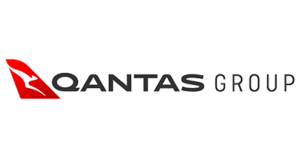 Qantas Group is harnessing the power of advanced technologies – including artificial intelligence (AI), big data, cloud computing, and the Internet of Things (IoT) – to drive operational excellence and elevate the customer experience across its airline portfolio.
Qantas Group is harnessing the power of advanced technologies – including artificial intelligence (AI), big data, cloud computing, and the Internet of Things (IoT) – to drive operational excellence and elevate the customer experience across its airline portfolio.
Central to the Group’s digital transformation is a strategic focus on leveraging technology and data to optimise operational processes and enhance decision-making. By integrating AI and machine learning, Qantas Group is able to sophisticatedly optimise workforce management and asset deployment. These technologies enable rapid learning from real-world performance, continuously refining planning models and driving incremental improvements that boost efficiency throughout its network.
Jetstar, a key subsidiary of Qantas Group, is also championing AI as a core enabler of its own transformation journey, integrating AI-powered tools to streamline operations and improve customer interactions.
Qantas Group employs AI across multiple use cases to improve service delivery and responsiveness. These include enhancing the ticketing process, providing agents with better-informed insights to assist customers, and significantly reducing the time between identifying customer issues and resolving them. Furthermore, the Group is actively exploring the potential of Large Language Models underpinning generative AI, assessing how these capabilities can be harnessed to further personalise services and automate complex workflows.
On the customer-facing side, the newly overhauled Qantas app empowers travellers with greater control over their bookings, featuring real-time baggage tracking and seamless integration with Qantas Loyalty. This digital enhancement ensures a more transparent and engaging journey from booking to arrival.
Through these comprehensive digital initiatives, Qantas Group continues to reinforce its commitment to innovation, operational resilience, and delivering world-class experiences for its customers.
Japan Airlines
 Japan Airlines (JAL) is dedicated to leveraging digital technologies to enhance safe and secure travel, deliver innovative customer experiences, and address evolving social challenges as part of its broader digital transformation journey.
Japan Airlines (JAL) is dedicated to leveraging digital technologies to enhance safe and secure travel, deliver innovative customer experiences, and address evolving social challenges as part of its broader digital transformation journey.
Central to JAL’s strategy are artificial intelligence (AI) and machine learning, which play a pivotal role in personalising customer experiences and improving operational performance. Notably, JAL has conducted a Proof of Concept for a generative AI solution designed to streamline cabin crew operations by automating handover report creation. This initiative aims to reduce crew workload, enabling more personalised and attentive service onboard. In parallel, JAL is collaborating with Mitsubishi Heavy Industries to develop an AI-powered prediction model that forecasts lightning-prone areas, enhancing aircraft safety and operational efficiency.
The airline is also advancing automation and autonomous vehicle technologies to boost both operational efficiency and passenger experience, alongside exploring innovative customer engagement through non-fungible tokens (NFTs).
To provide passengers with a connected inflight experience comparable to that on the ground, JAL has expanded free inflight WiFi service across all cabins on international flights. First and Business Class travellers enjoy unlimited connectivity, while Premium Economy and Economy passengers receive one hour of complimentary WiFi to stay connected during their journey.
Earlier this year, JAL unveiled its partnership with Panasonic Avionics Corporation, showcasing a state-of-the-art inflight entertainment (IFE) system on its Airbus A350-1000 fleet. Featuring 4K screens, faster network speeds, expanded storage, and mobile app integration, this system empowers passengers to personalise their entertainment experience pre-flight.
Looking ahead, JAL is actively developing its presence in Urban Air Mobility, with plans to commence commercial operations by 2027.
Cebu Pacific
 Cebu Pacific is laser-focused on best practice digital development, deploying highly effective and robust solutions to address evolving business and technology challenges. The airline is undergoing a comprehensive digital transformation aimed at enhancing the customer experience, streamlining operations, and driving overall efficiency by leveraging cutting-edge technologies such as generative AI, cloud-first strategies, and advanced data analytics.
Cebu Pacific is laser-focused on best practice digital development, deploying highly effective and robust solutions to address evolving business and technology challenges. The airline is undergoing a comprehensive digital transformation aimed at enhancing the customer experience, streamlining operations, and driving overall efficiency by leveraging cutting-edge technologies such as generative AI, cloud-first strategies, and advanced data analytics.
As part of its innovation journey, Cebu Pacific recently partnered with Ada to launch its first generative AI agent, becoming the first airline in Southeast Asia to fully integrate generative AI across its customer support channels. This ground-breaking innovation delivers instant, accurate, and human-like assistance across multiple touchpoints, significantly elevating the customer experience while enabling the airline to optimise its support operations at scale. This initiative underscores Cebu Pacific’s commitment to providing fast, seamless, and effective solutions for its passengers.
In addition to AI-driven customer service, Cebu Pacific is investing in enhancing its digital ecosystem by improving online platforms and integrating e-wallet payment options. These enhancements provide travellers with more convenient, flexible, and secure ways to manage their bookings and payments, further elevating the end-to-end journey.
On the operational front, Cebu Pacific has entered into a strategic agreement with Lufthansa Systems to implement its next-generation operations control and crew management solution. This sophisticated system harnesses real-time data from various sources, including weather conditions, airspace constraints, and aircraft performance metrics, to alert the operations control team to potential disruptions. This enables proactive, data-driven decision-making, allowing the airline to mitigate operational risks swiftly, reduce costs, and improve on-time performance. Ultimately, these advancements contribute to enhanced customer satisfaction through more reliable and efficient flight operations.
Through these concerted efforts, Cebu Pacific is not only positioning itself for ambitious growth but also reinforcing its commitment to delivering a superior, digitally empowered travel experience for its customers.
Hear more from Cebu Pacific at APEX FTE Asia Expo, taking place in Singapore on 11 to 12 November 2025. Ana Katrina Bautista, Director of Customer Journey Management, Cebu Pacific, is participating in a session focused on ‘Innovative approaches to minimising the impact of disruption on passengers and the business’.
See our 12 reasons to attend APEX FTE Asia Expo 2025 >> Register for APEX FTE Asia Expo 2025 – free to attend >>Malaysia Aviation Group
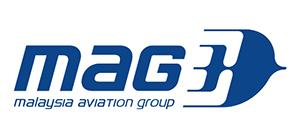 Malaysia Aviation Group (MAG), the parent company of Malaysia Airlines, Firefly, MASwings, and AMAL by Malaysia Airlines, is accelerating its commitment to digital empowerment by embracing cutting-edge technologies to transform its business and customer experience.
Malaysia Aviation Group (MAG), the parent company of Malaysia Airlines, Firefly, MASwings, and AMAL by Malaysia Airlines, is accelerating its commitment to digital empowerment by embracing cutting-edge technologies to transform its business and customer experience.
At the heart of MAG’s strategy is the belief that “Digital is Our Universe”. This ethos underpins the Group’s Long Term Business Plan 2.0 (LTBP 2.0), which aims to evolve MAG from a pure-play aviation business into Asia’s leading travel and aviation services group.
To achieve this vision, MAG has deepened its collaboration with Microsoft Malaysia, leveraging the Microsoft platform to enhance its technology infrastructure and enrich digital offerings across the Group. This partnership has enabled MAG to innovate in areas such as autonomous vehicles, data analytics, artificial intelligence (AI), machine learning, augmented reality (AR), and robotics, driving operational efficiency and elevating the customer journey.
A notable highlight in MAG’s digital transformation is Malaysia Airlines’ strategic collaboration with Google. This partnership focuses on leveraging advanced digital marketing and AI-driven solutions to optimise commercial operations, streamline processes, and deliver highly personalised experiences to travellers. By integrating these technologies, Malaysia Airlines aims to foster sustained growth while cultivating a seamless, customer-centric digital ecosystem.
Through these initiatives, MAG is positioning itself at the forefront of digital innovation in the aviation sector, combining technology and customer focus to redefine the travel experience and achieve its goal of becoming Asia’s premier travel and aviation services group.
Air New Zealand
 Air New Zealand continues to be a leader in the region in innovation, sustainability, and digital transformation, building on its vision to be “the world’s leading digital airline” while staying grounded in Kiwi values.
Air New Zealand continues to be a leader in the region in innovation, sustainability, and digital transformation, building on its vision to be “the world’s leading digital airline” while staying grounded in Kiwi values.
In 2025, the airline has taken bold steps across multiple strategic areas. A key highlight is the signing of a five-year strategic partnership with Tata Consultancy Services (TCS) to accelerate digital transformation. The partnership covers cloud migration, AI-powered automation, next-generation digital retail, and the upskilling of Air New Zealand employees across digital, AI, and cyber capabilities.
In another landmark move, Air New Zealand became the first Kiwi organisation to partner with OpenAI, deploying ChatGPT Enterprise across 3,500 corporate users. Internal teams are now building custom GPTs to improve collaboration, automate repetitive tasks, and enhance customer service and planning – signalling a shift toward AI-enabled operations.
These efforts align with a broader strategy to tap into global digital talent and work with industry leaders including Accenture, Cognizant, and IBS Software to deliver enhanced experiences across cargo, loyalty, engineering, and customer touchpoints.
On the sustainability front, the airline’s pioneering Mission Next Gen Aircraft programme continues to progress. Air New Zealand became the first airline globally to commit to purchasing BETA Technologies’ ALIA – an all-electric aircraft slated to enter the fleet in 2026. The programme represents a strategic push to decarbonise regional air travel and foster a global ecosystem for zero-emissions aircraft.
Air New Zealand is also enhancing the passenger experience, including the upcoming launch of newly retrofitted Boeing 787 Dreamliners with refreshed premium cabins, and improved digital services in lounges and onboard.
With its dual focus on climate leadership and digital innovation, Air New Zealand is not just adapting to the future of travel – it is actively shaping it.
Vietnam Airlines
![]() Vietnam Airlines has set an ambitious goal to become the premier digital airline in Asia-Pacific by 2030, with a comprehensive strategy focused on end-to-end digital transformation, operational excellence, and a reimagined customer experience.
Vietnam Airlines has set an ambitious goal to become the premier digital airline in Asia-Pacific by 2030, with a comprehensive strategy focused on end-to-end digital transformation, operational excellence, and a reimagined customer experience.
At the heart of this transformation is a strategic partnership with Vietnamese tech leader FPT, enabling Vietnam Airlines to explore and deploy cutting-edge technologies that are reshaping the airline’s operations and passenger journey. The partnership spans a wide spectrum of advanced solutions including generative AI, cloud computing, big data, blockchain, Internet of Things (IoT), and enterprise-grade digital platforms.
A standout initiative is the development of a next-generation e-commerce platform that will enable greater personalisation, expand the airline’s service ecosystem, and drive ancillary revenue. Vietnam Airlines is also investing heavily in AI-powered customer engagement, with tools such as chatbots, voice-bots, and content automation designed to deliver smarter, more seamless interactions.
Further supporting this transformation is the implementation of a comprehensive Customer Data Platform (CDP), as well as new CRM and ERP systems, mobile e-commerce applications, and internal self-service platforms that improve both passenger-facing services and back-end operations.
In addition, Vietnam Airlines has adopted Amadeus’ enhanced Passenger Service System (PSS) technology, enabling improved reservation, ticketing, and check-in processes.
This digital journey extends beyond corporate ambition – it also contributes to Vietnam’s national innovation agenda, supporting Resolution No. 57, which prioritises science, technology, and innovation as key pillars of national growth.
By embracing future-ready technologies and aligning with national policy, Vietnam Airlines is not only elevating its own capabilities but is also positioning itself as a pioneer of digital aviation transformation in the APAC region.
FTE APAC Airport Pioneer Awards 2025 nominees:
Changi Airport Group
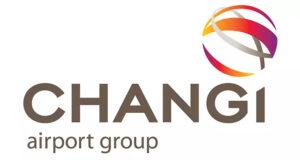 Changi Airport Group (CAG) is accelerating digital transformation through its in-house innovation hub – DIVA, which stands for Digital, Innovation, Ventures, and Analytics. It is reimagining airport operations and the end-to-end traveller experience through cutting-edge digital solutions.
Changi Airport Group (CAG) is accelerating digital transformation through its in-house innovation hub – DIVA, which stands for Digital, Innovation, Ventures, and Analytics. It is reimagining airport operations and the end-to-end traveller experience through cutting-edge digital solutions.
DIVA serves as Changi’s digital factory, developing, testing, and deploying scalable digital products that drive operational efficiency and elevate passenger satisfaction. Central to this is Changi’s SMART Airport Vision – a holistic strategy that leverages artificial intelligence (AI), advanced data analytics, automation, and immersive technologies to build a seamless, secure, and sustainable airport of the future.
Key innovations include:
- AI-powered security screening and operational systems that improve threat detection, reduce wait times, and optimise resource deployment.
- Biometric and self-service integration for check-in, bag drop, immigration, and boarding – reducing friction and enabling a faster, contactless journey.
- Immersive digital experiences such as Extended Reality (XR) to enhance passenger engagement and comfort.
- Internet of Things (IoT) and edge computing for real-time operational insights and smarter infrastructure management.
Changi is also exploring machine learning models to predict passenger flow, enabling better crowd management, while sustainability remains a key pillar – with DIVA supporting green initiatives through smart energy systems and data-driven resource optimisation.
Importantly, DIVA’s scope goes beyond the airport. It aims to engage travellers before arrival and after departure, creating a continuous, digitally connected travel journey.
By combining deep digital expertise with a strong user-centric design philosophy, Changi Airport is not only enhancing day-to-day operations but setting new global benchmarks for airport innovation. Through DIVA, CAG is redefining what it means to travel – making the journey smarter, smoother, and more personalised than ever before.
Changi Airport Group is a Headline Partner of APEX FTE Asia Expo, taking place in Singapore on 11 to 12 November 2025. Hear more from Changi Airport Group on the Premium Conference. Jayson Goh, Executive Vice President, Airport Management, Changi Airport Group, is participating in the Opening Keynote Panel – ‘Leadership strategies to maximise capacity, operational efficiency, customer experiences, revenues and workforce, and be ready for change in the Asia-Pacific region and beyond’. Meanwhile, Jeffrey Loke, Senior Vice President, DIVA (Digital Factory), Changi Airport Group, is speaking in a session focused on ‘Embracing collaboration and commercial innovation to create new revenue & business opportunities’.
See our 12 reasons to attend APEX FTE Asia Expo 2025 >> Register for APEX FTE Asia Expo 2025 – free to attend >>Airport Authority Hong Kong
 Hong Kong International Airport (HKIA) is leading a global transformation through its world-first, end-to-end standalone private 5G network, establishing a powerful digital foundation for its evolution into a smart ‘Airport City’. Developed by Airport Authority Hong Kong (AAHK), the shared Enterprise 5G Infrastructure supports both public 5G services and HKIA’s private network, reducing costs and physical footprint while enabling over 50 high-impact applications across operations.
Hong Kong International Airport (HKIA) is leading a global transformation through its world-first, end-to-end standalone private 5G network, establishing a powerful digital foundation for its evolution into a smart ‘Airport City’. Developed by Airport Authority Hong Kong (AAHK), the shared Enterprise 5G Infrastructure supports both public 5G services and HKIA’s private network, reducing costs and physical footprint while enabling over 50 high-impact applications across operations.
In the past year, AAHK has scaled 5G innovations across six key areas:
- Autonomous Vehicles: HKIA now operates 70 5G-connected vehicles including autonomous tractors, shuttles, and patrol cars, supported by robotic charging arms. Real-time video, emergency control, and fleet management improve safety and efficiency.
- Terminal Operations: 5G-enabled movable displays and gantry lighting systems offer real-time flight info, wayfinding, and remote monitoring.
- Passenger Experience: Cloud-based smart kiosks support faster check-in and biometric registration, with 240 units ready for Terminal 2.
- Security: Facial recognition and high-definition video analytics enhance monitoring and passenger flow management.
- IoT Integration: Systems such as baggage handling, structural monitoring, and electric ground services use real-time data to prevent failures and enable predictive maintenance.
- Ground Support: Apron line-marking robots use 5G and RTK tech to automate complex airfield tasks.
AAHK has extended 5G capabilities to its wider airport community, empowering cargo operators and partners with enhanced communication and operations. Trials are underway to enable facial recognition for lounge access.
By uniting stakeholders under a single, powerful network, AAHK has not only revolutionised HKIA’s operations but positioned it as a global benchmark for the future of aviation.
Hear more from Airport Authority Hong Kong on the Expo Stage at APEX FTE Asia Expo, taking place in Singapore on 11 to 12 November 2025. Hercules Lai, Manager, Future Travel Experience, Airport Authority Hong Kong, is participating in a session focused on ‘Improving efficiency and creating more seamless experiences through technology and digital advancements’ with a presentation titled ‘How every tweak transforms the Flight Token (aka One ID) experience and enhances efficiency at Hong Kong International Airport’.
See our 12 reasons to attend APEX FTE Asia Expo 2025 >> Register for APEX FTE Asia Expo 2025 – free to attend >>Incheon International Airport Corporation
 Incheon International Airport Corporation is undergoing a bold digital transformation across all operations, with a strong focus on AI-driven automation, innovation, and seamless passenger experiences. Central to this is the Fast Travel programme, which reimagines the end-to-end passenger journey. By analysing traveller needs and mapping key priorities such as time efficiency and ease of use, Incheon has rolled out biometric-enabled self-check-in kiosks, automated bag drops, and e-gates – delivering a hands-free, seamless experience.
Incheon International Airport Corporation is undergoing a bold digital transformation across all operations, with a strong focus on AI-driven automation, innovation, and seamless passenger experiences. Central to this is the Fast Travel programme, which reimagines the end-to-end passenger journey. By analysing traveller needs and mapping key priorities such as time efficiency and ease of use, Incheon has rolled out biometric-enabled self-check-in kiosks, automated bag drops, and e-gates – delivering a hands-free, seamless experience.
Looking ahead, Incheon is advancing the One ID initiative, working with global partners to enable passengers to move through multiple airports using a single biometric identity. This integration aims to eliminate repetitive identity checks, making international travel faster and more convenient.
AI and robotics also play a pivotal role in Incheon’s digital strategy. The airport is actively collaborating with startups and technology partners to test innovative solutions through Proof of Concept (PoC) trials. These focus on process automation and intelligent customer service applications.
One standout initiative is BOOST – a robotics-led transformation of baggage handling. In partnership with the FTE Baggage Innovation Working Group (BIWG), Incheon is deploying Doosan Robotics to automate the handling of heavy and odd-sized baggage. This significantly reduces manual workload and enhances operational efficiency.
In addition, Incheon is pushing the boundaries of passenger engagement with Extended Reality (XR). A new Metaverse-based indoor wayfinding service uses 3D spatial data and Augmented Reality (AR) to help travellers intuitively navigate complex terminal layouts – offering a more immersive and user-friendly experience.
By investing in smart technologies, collaborative innovation, and global interoperability, Incheon Airport is positioning itself as a forward-thinking leader in the next generation of air travel.
Japan Airport Terminal Co. Ltd
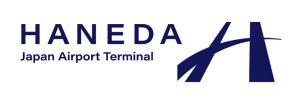 Japan Airport Terminal, the company responsible for the construction, management, and operation of Haneda Airport’s terminals, is redefining the future of aviation through its ambitious “terminal.0 HANEDA” initiative. This visionary programme represents a bold, cross-industry collaboration to transform the airport experience through cutting-edge technology, sustainability, and innovation.
Japan Airport Terminal, the company responsible for the construction, management, and operation of Haneda Airport’s terminals, is redefining the future of aviation through its ambitious “terminal.0 HANEDA” initiative. This visionary programme represents a bold, cross-industry collaboration to transform the airport experience through cutting-edge technology, sustainability, and innovation.
Set for a major rollout by 2026, “terminal.0 HANEDA” integrates artificial intelligence (AI), robotics, biometrics, the Internet of Things (IoT), and automation to create a seamless and efficient passenger journey. AI-driven systems will optimise staffing and resource allocation based on predicted passenger flow, while robotics and automation will streamline baggage handling and other operational processes. Facial recognition and biometric tools will support touchless check-in, security, and boarding, significantly enhancing convenience and efficiency.
Sustainability is a cornerstone of the initiative. Japan Airport Terminal is introducing green technologies such as solar power, energy-efficient infrastructure, and advanced waste reduction systems. These efforts align with global carbon reduction goals and position Haneda Airport as a model for environmentally responsible airport management.
What sets this initiative apart is its collaborative approach. Japan Airport Terminal is working closely with tech companies, startups, and aviation stakeholders to co-develop scalable innovations that can be adapted by airports worldwide.
Through “terminal.0 HANEDA,” Japan Airport Terminal is not only enhancing passenger satisfaction and operational excellence but also establishing Haneda as a global benchmark for smart, sustainable airport development. This pioneering project reflects a commitment to shaping the next generation of air travel – where technology and sustainability converge to deliver a truly modern airport experience.
GMR Group
 GMR Group, one of India’s largest private airport operators, is at the forefront of digital transformation in the aviation sector. With a strong focus on enhancing customer experience, driving operational efficiency, and enabling sustainable growth, GMR is reimagining the future of airport operations through technology.
GMR Group, one of India’s largest private airport operators, is at the forefront of digital transformation in the aviation sector. With a strong focus on enhancing customer experience, driving operational efficiency, and enabling sustainable growth, GMR is reimagining the future of airport operations through technology.
Central to this transformation is GMR Innovex, the Group’s dedicated innovation vertical. Innovex fosters a culture of open innovation, enabling collaboration between GMR and startups, tech partners, and ecosystem players to co-create solutions that address evolving airport and passenger needs.
One of Innovex’s most transformative developments is the Next-Gen Intelligent Airport Operating System (iAOS). This cutting-edge platform uses artificial intelligence (AI), machine learning (ML), and the Internet of Things (IoT) to create a real-time digital twin of the airport. By offering a unified view of landside, terminal, and airside operations, iAOS enables predictive decision-making, boosts operational efficiency, and delivers a more seamless, passenger-centric airport experience. It sets a new benchmark for intelligent airport management in India and beyond.
GMR’s commitment to collaboration is further exemplified through its strategic digital consortium with IndiGo Airlines. This ground-breaking partnership combines GMR’s infrastructure expertise with IndiGo’s operational insight to deploy advanced digital technologies that improve efficiency, sustainability, and the passenger journey across the Indian aviation ecosystem.
By leveraging next-gen technologies and building a connected innovation ecosystem, GMR is not only transforming its own airports but also shaping the future of aviation in India. Its forward-thinking approach positions it as a trailblazer in airport digitisation, with a clear focus on agility, scalability, and long-term industry impact.
Narita International Airport Corporation
 Narita International Airport is undergoing a major digital transformation through its visionary ‘AIR Narita’ innovation program, aimed at rebuilding and unifying multiple systems into a single integrated platform. This initiative lays the foundation for continuous business optimisation and sustainable growth by enabling seamless coordination across all departments and services.
Narita International Airport is undergoing a major digital transformation through its visionary ‘AIR Narita’ innovation program, aimed at rebuilding and unifying multiple systems into a single integrated platform. This initiative lays the foundation for continuous business optimisation and sustainable growth by enabling seamless coordination across all departments and services.
Narita is embracing innovative technologies – such as robotics, artificial intelligence (AI), and advanced ICT – to drive operational efficiency, productivity, and customer satisfaction. A key innovation is Japan’s first fully end-to-end biometric boarding process, allowing passengers to move through check-in, security, and boarding without paper documents or physical contact.
As part of its AI strategy, Narita has introduced BEBOT, an AI-powered multilingual chatbot that offers real-time support and information to passengers. The airport is also deploying driverless vehicle technologies on its airside and is leveraging real-time AI analytics for operational data, enabling predictive maintenance and smarter resource management.
Narita’s participation in IATA’s Fast Travel initiative is central to its goal of streamlining the passenger journey through automation and touchless technologies. Facial recognition, automated boarding bridge control, and AI-based customer support are just a few of the tools being rolled out. These innovations are designed not just for speed, but to create more personalised and human-centric experiences, using agentic AI and robotics to extend the airport’s service capacity.
Narita is also a founding member of the Airports for Innovation network – an international coalition of 10 forward-looking airports working together to co-develop and trial next-generation passenger experience solutions. The group recently launched its first joint Call4Startups, seeking disruptive ideas to shape the airport of the future.
Through these efforts, Narita International Airport is setting a global benchmark for airport-wide digital integration, safety, sustainability, and truly intelligent travel.
Taiwan Taoyuan International Airport
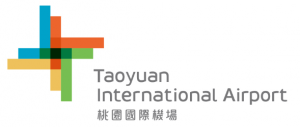 Taiwan Taoyuan International Airport (TPE) is at the forefront of digital transformation in aviation, harnessing advanced technologies to elevate both passenger experience and operational performance. As one of Asia’s most forward-thinking airports, TPE is strategically deploying artificial intelligence (AI), biometrics, automation, and the Internet of Things (IoT) to meet the evolving demands of modern air travel.
Taiwan Taoyuan International Airport (TPE) is at the forefront of digital transformation in aviation, harnessing advanced technologies to elevate both passenger experience and operational performance. As one of Asia’s most forward-thinking airports, TPE is strategically deploying artificial intelligence (AI), biometrics, automation, and the Internet of Things (IoT) to meet the evolving demands of modern air travel.
AI is central to TPE’s operational strategy. Intelligent systems analyse passenger flow, predict peak travel times, and enable proactive management of check-in, security, and boarding – improving efficiency and reducing wait times. Automated check-in kiosks and self-service bag drops further streamline the journey, providing passengers with greater convenience and control.
Biometric innovation is a standout feature at TPE. Facial recognition technology is integrated across key touchpoints – from contactless check-in and security screening to automated boarding gates. This not only accelerates processing times but also enhances security by verifying passenger identities consistently and accurately.
TPE’s use of IoT is transforming how the airport monitors and manages its operations. Connected devices track occupancy levels, environmental conditions, and facility usage in real time – enabling responsive services, smart maintenance, and optimised resource allocation. This ensures that passengers experience a safer, more comfortable, and efficiently run airport.
Looking ahead, TPE continues to push the boundaries of smart airport innovation. Plans are underway to expand next-generation automation, including robotic assistants and enhanced AI-driven solutions. Digital wayfinding through interactive kiosks and mobile apps is also in development, designed to guide passengers seamlessly through the terminal.
With a clear commitment to innovation, security, and passenger satisfaction, Taiwan Taoyuan International Airport is setting a high benchmark for airports across the region – and establishing itself as a digital leader in the global aviation landscape.
Western Sydney International Airport
 Western Sydney International Airport is set to become Australia’s most technologically advanced and digitally integrated airport when it opens in 2026. Designed from the ground up as the country’s first true “smart airport” it blends 21st-century thinking with cutting-edge technologies to deliver seamless, intuitive, and efficient passenger experiences around the clock.
Western Sydney International Airport is set to become Australia’s most technologically advanced and digitally integrated airport when it opens in 2026. Designed from the ground up as the country’s first true “smart airport” it blends 21st-century thinking with cutting-edge technologies to deliver seamless, intuitive, and efficient passenger experiences around the clock.
Built for the future, the terminal features smart infrastructure that supports effortless wayfinding, intuitive design, and adaptable space planning. Its airfield is being futureproofed to accommodate emerging aviation technologies, including electric aircraft, showcasing a commitment to innovation and sustainability.
At the heart of the airport’s strategy is a fully touchless, digital-first passenger journey. Biometric identity verification will streamline check-in, security, immigration, and boarding processes, reducing friction and enhancing speed. Smart baggage systems and automated handling will further improve operational efficiency and reliability.
The airport is also leveraging AI-driven data analytics to anticipate demand, manage passenger flow, and optimise operations in real time. Advanced crowd management tools will monitor density and support proactive decision-making to ensure a smooth and safe journey for all travellers.
Connectivity will be a cornerstone of the passenger experience, with high-speed 5G networks enabling real-time updates, seamless mobile app usage, and enhanced digital services throughout the airport.
Western Sydney International represents a rare opportunity: a major international airport built entirely in the digital age. With a focus on innovation, sustainability, and future-readiness, it is set to redefine how airports are designed and operated – not just in Australia, but globally. As a greenfield project with bold ambitions, Western Sydney International Airport is not only setting a new standard in smart aviation infrastructure but also positioning itself as a global benchmark for the next generation of airport experiences.
Hear more from Western Sydney International Airport in the Premium Conference at APEX FTE Asia Expo, taking place in Singapore on 11 to 12 November 2025. Alison Webster, Chief Customer and Commercial Officer, Western Sydney International Airport, is participating in a session focused on ‘Innovative airport expansion efforts that will deliver memorable travel experiences and enhanced operations’ with a presentation titled ‘Western Sydney International Airport will be a world-class smart airport, built to service 10 million passengers a year from the day it opens in 2026, but how will it deliver for its passengers and campus stakeholders through smart design, technology and 24-hour service?’
See our 12 reasons to attend APEX FTE Asia Expo 2025 >> Register for APEX FTE Asia Expo 2025 – free to attend >>Bangalore International Airport Limited
 Bangalore International Airport Limited (BIAL), operator of Kempegowda International Airport (BLR), is committed to leading aviation innovation by embracing cutting-edge technologies to build a truly ‘Future Ready’ airport.
Bangalore International Airport Limited (BIAL), operator of Kempegowda International Airport (BLR), is committed to leading aviation innovation by embracing cutting-edge technologies to build a truly ‘Future Ready’ airport.
In a landmark collaboration with KPMG India, BIAL is harnessing the transformative power of generative AI (GenAI) to revolutionise airport operations and elevate passenger experiences. This partnership focuses on deploying advanced GenAI models within a flexible, scalable architecture tailored specifically to BLR’s operational ecosystem. By processing vast real-time datasets, the platform empowers smarter decision-making through pattern recognition and trend forecasting – enabling proactive disruption management and fostering greater operational resilience.
Beyond GenAI, BLR Airport is advancing its digital transformation roadmap by leveraging cloud computing, blockchain, Internet of Things (IoT), machine learning, robotics, and immersive technologies such as augmented and virtual reality. These initiatives create a dynamic environment that encourages innovation and supports startups to develop cutting-edge solutions within the airport ecosystem.
BLR has also embraced the Metaverse with the launch of ‘BLR Metaport’, a virtual space enhancing passenger engagement and experience. Complementing this is the ‘BLR Pulse’ app – a personalised, omnichannel digital travel companion offering real-time updates, terminal navigation, interactive chatbot support, and control over the passenger journey at departures and arrivals.
Through these integrated technology investments, Bangalore International Airport is positioning itself at the forefront of digital innovation, focusing on enhanced efficiency, security, sustainability, and a seamless travel experience for its passengers.
Auckland Airport
 Auckland Airport is in the midst of an ambitious 10-year digital transformation, redefining the travel experience through bold investments in technology, innovation, and operational resilience. The airport’s strategy is focused on delivering a smarter, more seamless journey for passengers while enhancing efficiency and adaptability across its operations.
Auckland Airport is in the midst of an ambitious 10-year digital transformation, redefining the travel experience through bold investments in technology, innovation, and operational resilience. The airport’s strategy is focused on delivering a smarter, more seamless journey for passengers while enhancing efficiency and adaptability across its operations.
Core to this transformation is the deployment of technologies such as artificial intelligence (AI), robotics, automation, and Airport Collaborative Decision Making (A-CDM). AI is being used to personalise customer journeys, optimise operations, and inform smarter airport management, while automation and robotics streamline key processes behind the scenes. A strong emphasis on cybersecurity underpins these digital systems, ensuring the safety and integrity of interconnected operations.
A major milestone in this transformation is the recently announced overhaul of the airport’s check-in experience. Over the next four years, the existing check-in hall will be redeveloped into a 13,000sqm smart, digital departures area. Designed around the needs of the modern traveller, this future-focused space will enable fast, intuitive self-service check-ins powered by the latest in smart technology.
This transformation goes far beyond customer-facing services. Auckland Airport is modernising core platforms, enhancing resilience across mission-critical operations, and upgrading digital infrastructure across its entire precinct. By harnessing data, insights, and automation, the airport is unlocking new value and preparing for long-term growth in a high-expectation environment.
Through this visionary blend of strategic leadership and operational execution, Auckland Airport is creating a modern, connected, human-centred travel hub. Its digital transformation not only meets today’s demands but also lays the groundwork for tomorrow’s innovations – positioning Auckland as one of the world’s most forward-thinking airports.
Airports of Thailand
 Airports of Thailand (AOT) is steering a bold vision: to operate “the world’s smartest airports”. Digital innovation, smart infrastructure, and a strong service ethos are central to its strategy. Through its Digital Action Plan – built around elevating service quality and security, boosting management efficiency, strengthening the digital workforce, and expanding ICT infrastructure – AOT is rapidly modernising Thailand’s airport system.
Airports of Thailand (AOT) is steering a bold vision: to operate “the world’s smartest airports”. Digital innovation, smart infrastructure, and a strong service ethos are central to its strategy. Through its Digital Action Plan – built around elevating service quality and security, boosting management efficiency, strengthening the digital workforce, and expanding ICT infrastructure – AOT is rapidly modernising Thailand’s airport system.
Under its ‘Living Airport’ concept, AOT has rolled out enhanced digital and passenger‑centric services. These include fast automatic self‑check‑in kiosks, self‑bag drop using barcode luggage tags, passenger baggage reconciliation, advanced passenger processing systems, and a redesigned ‘Sawasdee by AOT’ mobile app that delivers real‑time flight status, maps, gate info, and promotions for shops, F&B and tourism services. The app also personalises user experience using passenger behaviour data.
AOT is also deploying AI and biometric verification systems to streamline services and enhance security. For instance, a biometric identity verification system has been implemented across all six AOT airports, helping reduce queue times and improve the Airport Service Quality (ASQ) metrics.
By combining rapid traffic growth, smart customer‑centric technologies, and large‑scale infrastructure investment, AOT is not just modernising Thailand’s airports but is positioning its network as a model of digital, operational and service excellence in the region.
Malaysia Airports
 Malaysia Airports is advancing a comprehensive digital transformation agenda across its extensive airport network as a key strategic priority. The organisation is committed to enhancing service quality by implementing practical innovations that prioritise passenger convenience, operational efficiency, and overall digital readiness. By adopting smart, passenger-centric technologies, Malaysia Airports empowers travellers with greater control and flexibility throughout their journey.
Malaysia Airports is advancing a comprehensive digital transformation agenda across its extensive airport network as a key strategic priority. The organisation is committed to enhancing service quality by implementing practical innovations that prioritise passenger convenience, operational efficiency, and overall digital readiness. By adopting smart, passenger-centric technologies, Malaysia Airports empowers travellers with greater control and flexibility throughout their journey.
Central to this vision is the Airports 4.0 digital innovation framework, which focuses on four core themes: terminal operations, passenger experience, staff mobility, and safety & security. This holistic approach integrates advanced digital solutions to foster an agile, connected, and innovation-led airport ecosystem. Key initiatives include a mobile app delivering real-time flight and airport information, AI-powered surveillance systems for crowd management and retail analytics, and the deployment of a single token system enabling contactless passenger journeys for enhanced safety and convenience.
Additionally, Malaysia Airports leverages Airport Collaborative Decision Making (ACDM) platforms and seamless connectivity solutions to optimise operations and improve coordination between airport stakeholders. These efforts reinforce Malaysia Airports’ vision of becoming a truly “connected and digital airport” that supports smooth passenger flows and efficient resource management.
In a recent strategic partnership with WEBQLO, Malaysia Airports is transforming traveller engagement by blending AI-driven insights, strategic content delivery, and real-time interaction. This collaboration enables the airport to create stronger, more personalised connections with passengers at every touchpoint, enriching the overall travel experience.
Supporting these initiatives is a robust digital infrastructure featuring 5G, Wi-Fi 6, and Internet of Things (IoT) technologies. This foundation ensures a seamless, secure, and highly connected environment that underpins Malaysia Airports’ ongoing journey towards digital excellence and innovation leadership.
Melbourne Airport
![]() Melbourne Airport is embracing a bold digital vision, placing technology at the core of its mission to deliver a seamless, stress-free traveller journey. From digital wayfinding to frictionless WiFi access, the airport is committed to using smart, intuitive technology to enhance passenger experience and operational excellence across every touchpoint.
Melbourne Airport is embracing a bold digital vision, placing technology at the core of its mission to deliver a seamless, stress-free traveller journey. From digital wayfinding to frictionless WiFi access, the airport is committed to using smart, intuitive technology to enhance passenger experience and operational excellence across every touchpoint.
A key focus of Melbourne Airport’s strategy is the integration of emerging technologies, including automation, artificial intelligence (AI), the Internet of Things (IoT), and biometrics. These tools are reshaping how the airport operates, enabling greater efficiency, flexibility, and passenger convenience.
AI and machine learning are being actively deployed to forecast passenger flows, optimise staffing levels, and reduce congestion at peak times. Predictive modelling helps allocate resources dynamically, while AI-powered chatbots offer real-time support for flight information, airport services, and amenities – greatly improving digital customer service.
Self-service check-in kiosks and automated boarding gates have become standard across terminals, streamlining the passenger journey. Meanwhile, trials of biometric check-in and facial recognition signal a long-term commitment to frictionless, secure processing at scale. Investments in advanced screening technologies and automated security processes are also helping reduce wait times and enhance safety.
Melbourne Airport is also applying IoT-based solutions across operations. From monitoring restrooms and seating areas to managing baggage handling systems, the airport uses real-time data to drive predictive maintenance and smarter resource allocation. These efforts directly support improved passenger comfort and operational responsiveness.
Complementing these innovations, interactive digital signage and a feature-rich mobile app provide real-time flight updates, terminal directions, and service information, empowering passengers to navigate the airport with confidence.
Melbourne Airport’s tech-forward strategy reflects its commitment to becoming a future-ready hub, where innovation is not just adopted – but embedded into every part of the airport experience.
Hear more from Melbourne Airport in the free to attend Expo Stage Schedule at APEX FTE Asia Expo, taking place in Singapore on 11 to 12 November 2025. Nicholas Donovan, Head of Aviation Services, Melbourne Airport, is participating in a session focused on ‘Improving efficiency and creating more seamless experiences through technology and digital advancements’ with a presentation titled ‘Maximising every metre: Expanding impact before expanding walls’.
See our 12 reasons to attend APEX FTE Asia Expo 2025 >> Register for APEX FTE Asia Expo 2025 – free to attend >>Shanghai Hongqiao International Airport
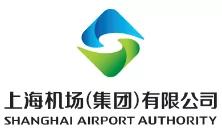 Shanghai Hongqiao International Airport continues to lead in operational efficiency and passenger convenience through the integration of artificial intelligence (AI) and machine learning (ML) technologies. Building on its previous enhancements to the Airport Operational Database and Resource Management System (AODB/RMS), the airport has further evolved its predictive capabilities with a next-generation AI/ML-powered ETA prediction model.
Shanghai Hongqiao International Airport continues to lead in operational efficiency and passenger convenience through the integration of artificial intelligence (AI) and machine learning (ML) technologies. Building on its previous enhancements to the Airport Operational Database and Resource Management System (AODB/RMS), the airport has further evolved its predictive capabilities with a next-generation AI/ML-powered ETA prediction model.
This model leverages historical and real-time flight data to forecast aircraft arrival times with greater accuracy, enabling smarter pre-allocation of aircraft stands. The outcome has been significant: over 75% of flights now arrive within 30 minutes of their scheduled landing time. This has directly resulted in a 25% reduction in stand changes, improving the consistency of gate assignments, minimising airside operational disruptions, and reducing security risks caused by flight conflicts.
Crucially, this improvement allows more passengers to disembark directly via airbridges rather than buses, significantly enhancing the passenger experience, especially during peak periods.
In parallel, the airport is championing sustainability and smart mobility. It now operates China’s first airport parking facility with dedicated EV charging services and priority queue lanes for new energy taxis, supporting the city’s broader green transport initiatives and reducing emissions in airport operations.
Looking ahead, Shanghai Hongqiao continues to explore further enhancements through data analytics, intelligent resource scheduling, and integration with regional air traffic systems to build a more connected, efficient, and passenger-friendly aviation ecosystem.
Through its AI-driven strategy and commitment to innovation, Shanghai Hongqiao International Airport is cementing its role as a digital pioneer among China’s busiest airports and an active contributor to the future of smart airport operations.
Kansai Airports
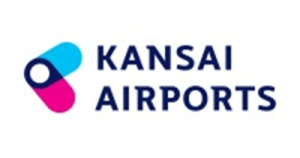 Kansai Airports – operator of Kansai International Airport, Osaka International Airport, and Kobe Airport – is part of the network of VINCI Airports (a Corporate Partner of the FTE Digital, Innovation & Startup Hub) and a key player in driving innovation across the Asia-Pacific region. Kansai Airports is leveraging advanced digital solutions including self-service, mobile integration, and biometrics to deliver a seamless, end-to-end passenger experience.
Kansai Airports – operator of Kansai International Airport, Osaka International Airport, and Kobe Airport – is part of the network of VINCI Airports (a Corporate Partner of the FTE Digital, Innovation & Startup Hub) and a key player in driving innovation across the Asia-Pacific region. Kansai Airports is leveraging advanced digital solutions including self-service, mobile integration, and biometrics to deliver a seamless, end-to-end passenger experience.
A standout initiative is the deployment of intelligent, mobile check-in kiosks that use data to identify congestion points and automatically relocate to optimise passenger flow. With built-in collision avoidance systems, these kiosks contribute to a fully connected and adaptive airport environment.
Kansai Airports is also advancing its automation strategy across all three airports with robotics and AI technologies, aimed at increasing passenger handling capacity, enhancing operational efficiency, and better serving airline partners.
In 2025, Kansai International Airport celebrated a major terminal modernisation and expansion, incorporating a suite of new technologies, including shared self-bag drop systems, 10 AI-enabled security screening lanes, immigration via eGates, and call-to-gate technology for dynamic gate allocation and improved passenger comfort.
Beyond digital transformation, Kansai Airports is showing leadership in sustainability innovation. It is part of a landmark initiative to launch Japan’s first large-scale commercial production of Sustainable Aviation Fuels (SAF), reinforcing its commitment to decarbonising air travel. Additionally, Kansai Airports has signed a strategic partnership with Airbus to prepare for the introduction of hydrogen-powered aircraft, a national first.
Through these pioneering initiatives, Kansai Airports is setting a new standard for what a future-ready airport ecosystem can look like – blending technology, sustainability, and passenger-centricity at scale.
See our 12 reasons to attend APEX FTE Asia Expo 2025 >> Register for APEX FTE Asia Expo 2025 – free to attend >>